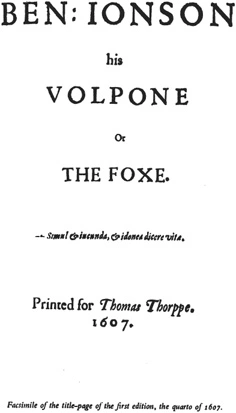José Ferrer appeared on Broadway in 1948 in Jonson’s play; but the much-heralded production announced by Orson Welles in 1955 with himself as Mosca to Jackie Gleason’s Volpone did not materialize. In 1964 Volpone was seen at the new Tyrone Guthrie Repertory Theatre in Minneapolis, Minnesota, starring Douglas Cambell. An opera with music by Malcolm Williamson based on Volpone was seen in London in 1964, and in that year Bert Lahr appeared on Broadway in a musical Foxy, set in Alaska during the Gold Rush, and remotely inspired by Jonson’s play. In 1965 John Neville played Mosca in a production at the Nottingham Playhouse. Leo McKern appeared as Volpone in Oxford and London in 1966–67 under the direction of Frank Hauser, a production which won more critical acclaim than Guthrie’s for the National Theatre in 1968, when fussy business and good and bad ideas (animal costumes and movement; animal noises) blurred the lucid story-line.
2. LOCATION AND TIME-SCHEME
The action in Volpone takes place in Volpone’s bedroom, inside and outside Corvino’s house, in Sir Politic’s lodging, in the Scrutineo, and in the street. The action covers one day, from Volpone’s awakening (and Voltore’s ‘early visitation’) to the sentences passed on Volpone and Mosca late in the afternoon.
3. EDITIONS AND CRITICAL COMMENT
Volpone has been reprinted in various collected and selected editions of Jonson, and in many anthologies. It has been edited and annotated by J. D. Rea (1919), by Arthur Sale (1951), by David Cook (1962), and, as the first volume of the new Yale Ben Jonson, by A. B. Kernan (1962). J. J. Enck and E. B. Partridge have chapters on the play (the latter is concerned with imagery and what it tells us); J. A. Barish’s compendium of Jonsonian criticism includes his own demonstration that Sir Politic and Lady Would-be are relevant to the play as a whole; and Professor Harry Levin has contributed a learned analysis of Mosca’s interlude in 1, ii to Philological Quarterly, XXII (1943).

EPISTLE
To the
Most Noble And Most Equal Sisters,
The Two Famous Universities,
For Their
Love and Acceptance Shown to His Poem
In The Presentation;
Ben. Jonson,
The Grateful Acknowledger,
Dedicates Both It And Himself.
10 There follows an Epistle, if
you dare venture on the length.
Never, most equal Sisters, had any man a wit so presently excellent as that it could raise itself; but there must come both matter, occasion, commenders, and favourers to it. If this be true, and that the fortune of all writers doth daily prove it, it behooves the careful to provide well toward these accidents, and, having acquired them, to preserve that part of reputation most tenderly wherein the benefit of a friend is also defended. Hence is it that I now render myself grateful and am studious to justify the bounty of
20 your act, to which, though your mere authority were satisfying, yet, it being an age wherein poetry and the professors of it hear so ill on all sides, there will a reason be looked for in the subject. It is certain, nor can it with any forehead be opposed, that the too much licence of poetasters in this time hath much deformed their mistress, that, every day, their manifold and manifest ignorance doth stick unnatural reproaches upon her; but for their petulancy it were an act of the greatest injustice either to let the learned suffer, or so divine a skill (which indeed should not be attempted with unclean hands) to fall under the least contempt. For, if men
30 will impartially, and not asquint, look toward the offices and function of a poet, they will easily conclude to themselves the impossibility of any man’s being the good poet without first being a good man. He that is said to be able to inform young men to all good disciplines, inflame grown men to all great virtues, keep old men in their best and supreme state, or, as they decline to childhood, recover them to their first strength; that comes form the interpreter and arbiter of nature, a teacher of things divine no less than human, a master in manners; and can alone, or with a few, effect the business of mankind: this, I take him, is no subject
40 for pride and ignorance to exercise their railing rhetoric upon. But it will here be hastily answered that the writers of these days are other things: that not only their manners, but their natures, are inverted, and nothing remaining with them of the dignity of poet but the abused name, which every scribe usurps; that now, especially in dramatic, or, as they term it, stage poetry, nothing but ribaldry, profanation, blasphemy, all licence of offence to God and man is practised. I dare not deny a great part of this, and am sorry I dare not, because in some men’s abortive features (and would they had never boasted the light) it is over-true; but that all are
50 embarked in this bold adventure for hell is a most uncharitable thought, and, uttered, a more malicious slander. For my particular, I can, and from a most clear conscience, affirm that I have ever trembled to think toward the least profaneness, have loathed the use of such foul and unwashed bawdry as is now made the food of the scene. And, howsoever I cannot escape, from some, the imputation of sharpness, but that they will say I have taken a pride, or lust, to be bitter, and not my youngest infant but hath, come into the world with all his teeth; I would ask of these supercilious politics, what nation, society, or general order, or state I
60 have provoked? what public person? whether I have not in all these preserved their dignity, as mine own person, safe? My works are read, allowed (I speak of those that are entirely mine); look into them.
1 comment